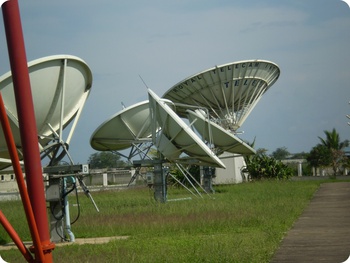Malawi has set 2013 as the year it will completely switch from analogue to digital broadcasting, according to the Ministry of Information and Civic Education, which is overseeing the process.
According to a report the ministry presented to parliament recently, Government has already engaged a Consultant, LS Telecom of South Africa, to spearhead the process.
The consultant is expected to recommend on the type of transmission network to be implemented in each area, taking into account cost of implementation, performance, and topography.
The report also says the consultant is expected to produce a map showing optimal operating parameters which will include transmission power, antenna height, indoor or outdoor receiving antenna.
LS Telecom will also make recommendation on what equipment will be replaced on the current analogue transmission network and advice on cost efficient infrastructure equipment to ensure quality multiplexing, distribution, and transmission of Digital TV and Radio Signals.
The consultant will also produce a statement of requirements with design and equipment specifications and costing.
The ministry says it is running the process in line with guidelines from the International Telecommunication Union (ITU). The report explains that in 2000 the ITU agreed that all countries should migrate from analogue to digital broadcasting.
Considering that Digital television (DTV) is the transmission of audio and video by digital signals, in contrast to the analogue signals used by analogue TV which has standards of NTSC, PAL, SECAM, Malawi was at first scrutinizing the four standards of Digital TV that it could settle for.
The four standards are Advanced Television Systems Committee (ATSC), adopted by the USA, Canada, Mexico and South Korea; Integrated Services Digital Broadcasting Terrestrial (ISDB-T), adopted by Japan and DMB-T/H, adopted by China Malawi
Malawi has agreed to follow is the Digital Video Broadcast Terrestrial (DVB-T), adopted by countries in Europe, Asia and Africa that have already decided which digital television standard they will use.
Information ministry technicians, who have been lobbying parliament to support the switch through the allocation of resources, presented a case before the members of parliament aimed at convincing them on the need to make the switch.
Added efficiency
The government technicians say digital technology has extended to the provision of broadcasting services primarily due to the spectrum efficiency and flexibility of the technology.
“The digital technology allows programmes to be compressed in such a way that where only one programme could be transmitted on a single analogue frequency, several programmes can be transmitted with the digital technology,” explain the technicians.
This, they say, leads to additional programme capacity that would otherwise require additional spectrum with the analogue technology.
Another reason why the switch is important is because digital technology allows for a better and more uniform picture quality to be received throughout the coverage area whereas with the analogue technology the picture quality progressively degrades the further one is from the transmitter.
“Interactive services are also supported by the digital technology, allowing other information to be made available to the viewer, for example, weather forecasts, emergency information, electronic shopping, games, electronic newspapers, including internet access,” the technicians explain.
They also told the Malawi parliament that the planning of frequency bands by countries on a regional basis has generally been applied within the ITU to allow for the coordination of frequencies between countries to avoid interference between the broadcasting services of different countries.
“This allows for efficient utilisation of the limited frequency spectrum resources,” they said adding that this approach, known as apriori planning, enables countries to preserve their right to equitable access to frequencies and satellite orbits, irrespective of when those frequencies or orbits are going to be used by the respective country.
SADC agreement
The ministry technocrats add that Malawi is bound by the Geneva agreement, GE-06, which was signed in 2006 by countries in ITU Region 1, which includes SADC countries like Malawi.
The agreement provides the frequencies that are to be used by each country for digital broadcasting as well as the technical planning parameters that were used for the development of the plan (DVB-T based).
It also provides the conditions under which those frequencies are to be used as well as the timeframe for migration from the current analogue television broadcasting technology to digital television broadcasting technology on 17 June 2015.
Malawi, as is the case with all other SADC member states, has agreed on DBV-T2 standard and on an earlier date of 31 December, 2013 for switch-over, to allow for time to resolve any challenges that may be encountered by the switchover.
Running the process
Malawi started the Digital migration process in 2009 with digital migration training for operators likely to be affected by the migration process.
The government has finished developing a digital migration strategy which will guide the country on how to implement the whole program.
It has also finished developing a Communications Strategy for the migration process which will ensure that the nation is informed and made aware of the whole migration process.
In order to achieve all this Malawi put in place a steering committee, and sub-committees that were charged with establishing Policy, Legal, Technical, Content and Economical issues regarding the migration process.
The policy Sub-committee which is chaired by the Ministry of Information and Civic Education (MoICE) was charged with duties to review these issues of Public Broadcasting; free To Air (FTA) and subscription broadcasting services; signal Distribution Issues; dual Illumination period as well as set-top box subsidies.
It was also supposed to look at the implications of digital broadcasting on existing policies and legislation
The legal Sub-committee, which is chaired by Ministry of Justice, is was mandated to look at all legal and regulatory issues leading to effective migration. These include broadcasting rights and copyright issues.
On the other hand the technical sub-committee by state owned broadcaster, the Malawi Broadcasting Corporation (MBC) was mandated to look at all technical issues in respect of frequency planning and the development of relevant technical standards for the broadcasting services.
These included multiplexing; dual Illumination transmission; standards of decoders; resource sharing between broadcasters; collaborations with other stakeholder like Communication Regulators’ Association of Southern Africa (CRASA).
The content sub-committee, chaired by privately-owned radio station, Zodiak Broadcasting Station (ZBS), was mandated to consider issues of increasing local content; funding mechanisms for the development of content; to educate consumers on what to buy and avoid and inform the public on the availability of set top boxes.
It was also charged with responsibility of providing information to the public on dual illumination period as well as informing the public on the available digital signals.
The economic sub-committee, chaired by the Ministry of Finance and Development Planning, is mandated to look at all economic issues mainly impacting the viewers in respect of the migration process.
Set top box funding
The report to parliament also states that the issue of making the Set Top Box (STB) affordable has been discussed at length, with proposed subsidization of the STB/duty waiver as one method of encouraging the uptake of digital broadcasting services.
Ministry of Information technicians approached parliament over the funding issue, which is threatening the success of the Digital Migration Project. It is currently being funded by Malawi Government only.
In the 2010/11Financial year, there was a provision of MK190 Million in the budget, however only MK20 was released.
In the current financial year there is a provision of MK205 Million.
The report says this is insufficient, considering that it is expected to pay the consultant developing the migration plan as well as start procuring the required equipment.
The Ministry had requested MK1.2 Billion for the Digital Migration Project, but failed to secure the required budget.


.jpeg&w=60&q=100&h=60)









